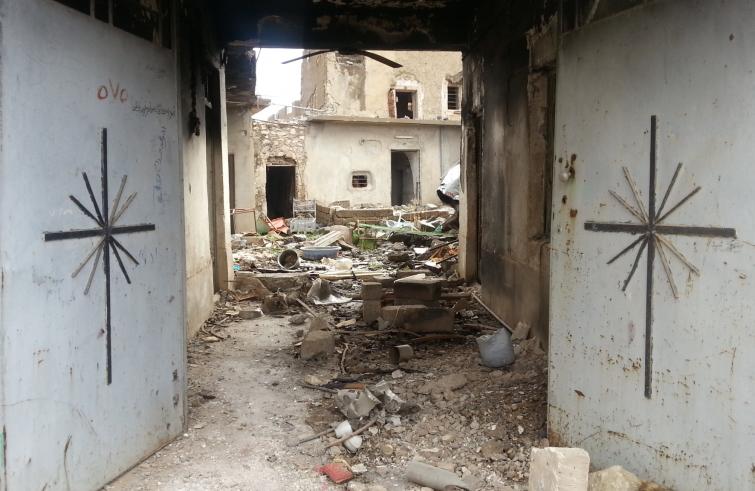Persecuted Christians
Three years after having fled their villages, while the Islamic State militia advanced into their lands, the Christian population of the Nineveh Plains are making a slow return to their homes. Now that the Iraqi army has regained control of the area they hope they can return to their homes destroyed or set ablaze by ISIS. The testimony of Sister Silvia, Iraqi nun, the story of her flight from ISIS, of her yearning to return to live in the land of her forefathers, of rebuilding schools, homes, convents. She conveyed her gratitude to the Iraqi army and to the Muslim soldiers for placing crucifixes on the damaged churches. On September 28 an international conference promoted by ACN will present a project for the reconstruction of Christian villages in the Nineveh Plains

“We fled from Qaraqosh without having the time to take anything, in the midst of armed strife: we were terrorized. All of us thirty-six sisters abandoned the convent. It was 11 p.m. of August 6 2014 …” Thus begins the story of Sister Silvia, an Iraqi woman religious, member of the Order of the Dominican Sisters of Saint Catherine of Siena. She shared the account of her flight together with 120 Iraqi Christians from the Nineveh Plains, while the militia of the Islamic State (ISIS) advanced into their lands. This is not the first time that the nun, 37, born in Alqosh, recalls those tragic moments. For her it’s like rewinding the memory tape, now that three years have gone by. But the scar of those days and of what happened since then are open wounds for tens of thousand of Christians still living in Erbil, the capital of Iraqi part of Kurdistan, waiting to return to their villages, most of which destroyed by ISIS and now liberated by the Iraqi army.
For her it’s like rewinding the memory tape, now that three years have gone by. But the scar of those days and of what happened since then are open wounds for tens of thousand of Christians still living in Erbil, the capital of Iraqi part of Kurdistan, waiting to return to their villages, most of which destroyed by ISIS and now liberated by the Iraqi army.
Sister Silvia also speaks for them. She speaks in a low tone of voice, with a fixed glance almost as if to “freeze” the picture of those hours. “It was a mass exodus: we knew what had happened to the Yazidis a few days before: 400 youths were killed and 5000 young women were sold as slaves.” The first signs of what was to happen were already visible in the month of June, when ISIS started to storm into the Nineveh Plains: “We were left without water and electricity and we heard the shots being fired by the militia and the army. Christians were told to leave their villages or to convert to Islam or they would die.” Life in Erbil was not – and is still not – easy. I went to our Institute with the other Sisters. Since 2014 – said the nun, as physically slim as she is strong and determined in the spirit – 24 nuns of our Order have died. There were 73 of us in the Nineveh Plains. They were killed by the shock, the fear and the stress.” What about the others? “Those who had the possibility asked relatives to help them: in the beginning many of them slept in gardens, on the street and in churches.
We remained with our people, bringing spiritual and material support. Over the past years we received a great amount of support thanks to the Catholic Church and to her bodies such as Aid to the Church in Need, Caritas and Missio. They donated sanitation kits, clothing items, medicines… they set up prefabricated houses and also contributed to half the amount of people’s rents. The Italian Church is very close to us.
Schools were built along with small healthcare facilities for those in need of treatment. Today nobody sleeps on the street. Everyone has a roof above their head. We would never have overcome all of this without our faith in God and without the help of Churches worldwide.
We are the offspring of the Church, we are not orphans.”
Today many of those who fled from Erbil are considering returning to their villages. A ray of light illuminates Sister Silvia’s sombre recollections, her eyes start shining again. And so does her voice. There is talk of reconstruction, of returning home. This hope is coupled by a token of “gratitude” to the Iraqi army “who battled to liberate the Nineveh Plains.”
“I wish to thank our Muslim soliders who sacrificed their own lives because they believed that Christians are part of Iraq, they are Iraqis.
Despite the different faiths and ethnicities we are one people.” These powerful words take on an even deeper meaning when Sister Silvia reveals:
“after the villages of the Plain had been liberated the military wanted to put the crucifixes back on the churches, where they once were. When they saw the priests return to what remained of their churches they gathered in celebrations and whenever possible they also tolled the church bells. Some of the soldiers asked to pray with our priests.”
 However, there are still many obstacles that prevent Christians from returning to the liberated villages. “The main ones – Sister Silvia said – are security and destruction; veritable emergencies. There is rubble everywhere. Some of the villages were torn down completely. Churches and convents were desecrated and destroyed, including our church in Qaradosh dedicated to Mary Immaculate, which we wish to rebuild with the help of ACN. Christian families are slowly starting to return. There are over 700 in Telleskof 700, approximately 500 in Qaraqosh. Small shops are reopening, there is a school and a healthcare centre.” In this regard, the ACN project that will be presented on September 28 in Rome envisages the rebuilding of 13 thousand houses destroyed by ISIS in the Nineveh Plains, a veritable Marshall Plan, with an estimated cost of 250 million dollars. “For Iraqi Christians returning to their villages means to start living again, to return to practice our faith in the land of our forefathers.
However, there are still many obstacles that prevent Christians from returning to the liberated villages. “The main ones – Sister Silvia said – are security and destruction; veritable emergencies. There is rubble everywhere. Some of the villages were torn down completely. Churches and convents were desecrated and destroyed, including our church in Qaradosh dedicated to Mary Immaculate, which we wish to rebuild with the help of ACN. Christian families are slowly starting to return. There are over 700 in Telleskof 700, approximately 500 in Qaraqosh. Small shops are reopening, there is a school and a healthcare centre.” In this regard, the ACN project that will be presented on September 28 in Rome envisages the rebuilding of 13 thousand houses destroyed by ISIS in the Nineveh Plains, a veritable Marshall Plan, with an estimated cost of 250 million dollars. “For Iraqi Christians returning to their villages means to start living again, to return to practice our faith in the land of our forefathers.
To return in order to rebuild what ISIS destroyed inside each one of us, freedom, security, joy.
It’s hard to support the hope of the Iraqi people – Sister Silvia admitted – for there can be no hope where there is war, and no freedom where there is war. That’s why we need God’s presence, the only thing that can give us hope. If we believe that He is here with us then we will have the strength and the hope to rebuild and move on. Our faith will always keep thriving, because Jesus is with us.”